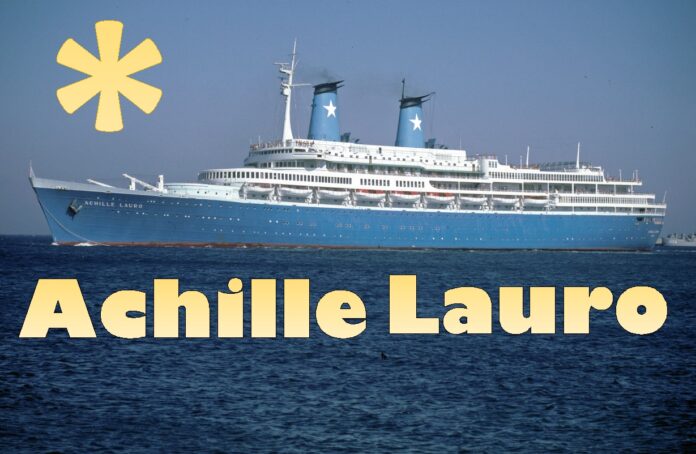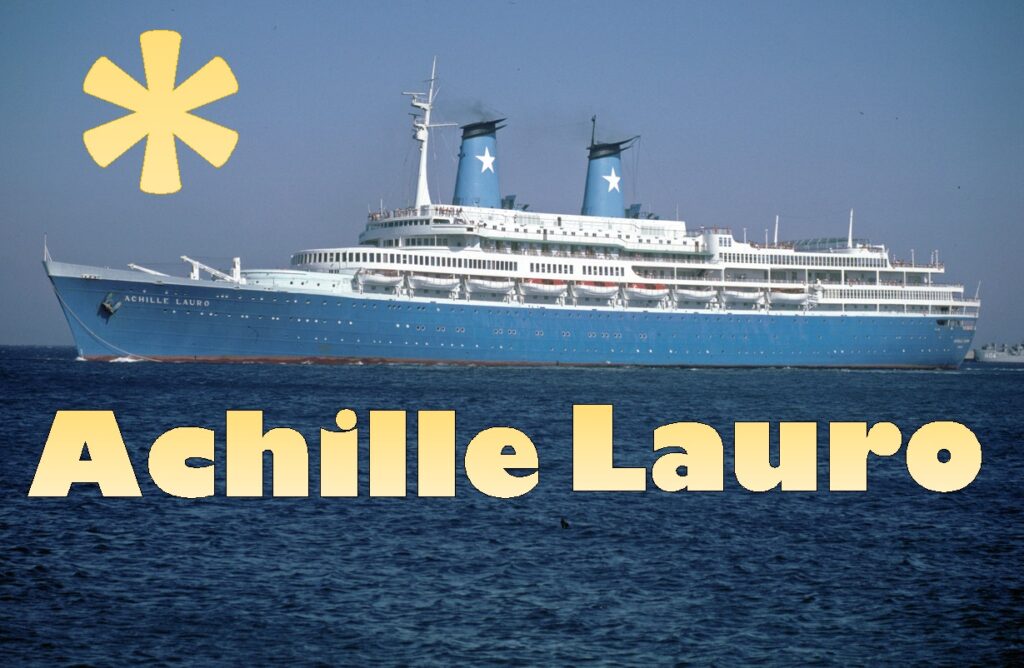
(www.MaritimeCyprus.com) On 7 October 1985, four members of the Palestine Liberation Front (PLF) hijacked the Italian cruise ship Achille Lauro when it was in the Mediterranean Sea en route from Alexandria, Egypt to Port Said.
The Achille Lauro left Genoa, Italy, on October 3 for a 12-day cruise of the Mediterranean Sea. Aboard were 748 passengers and several hundred crew. On October 7 the ship docked at Alexandria, Egypt, and 651 passengers disembarked to tour the pyramids, intending to rendezvous with the ship at Port Said that night. After the sightseers had gone ashore, four men brandishing AK-47 machine guns corralled the crew and the remaining 97 passengers and forced the captain to leave port. They allowed crew members to continue with their duties.
The men – who had been posing as passengers – were members of a PLF faction headed by Mohammed Zaidan (who used the pseudonym Mohammed, or Abu, ʿAbbās) and aligned with the Palestine Liberation Organization (PLO). After commandeering the vessel, they demanded that Israel release 50 Palestinian prisoners. Israel did not respond, and the vessel headed to Tartus, Syria. Syrian authorities, at the request of the U.S. and Italian governments, refused to allow the vessel to dock when it arrived the next day.
At approximately 3:00 pm on October 8, the militants shot Leon Klinghoffer, an elderly American Jewish man confined to a wheelchair, and threw his body overboard. He was thought to have been singled out because of his religion. The hijackers then steered the ship to Cyprus, where they were also denied port. By this time, Yāsir ʿArafāt, chairman of the PLO, had been contacted; he sent Zaidan to Cairo to mediate the situation. Both men denied any involvement in the hijacking.
Stymied, the hijackers directed the Achille Lauro back to Port Said. They established radio contact with Egyptian authorities and began negotiations as they neared the coast on the morning of October 9. In exchange for releasing the hostages, the hijackers demanded safe passage through Egypt and immunity from prosecution. Egypt acceded and at 5 pm the men disappeared into Port Said.
Though Egypt maintained that the hijackers had left the country, U.S. intelligence reports indicated that they remained there in hiding. The plane on which they had planned to escape—accompanied by Zaidan—was located, and U.S. Pres. Ronald Reagan gave the order to intercept it. On the evening of October 10, U.S. fighter jets blockaded the larger passenger craft and forced it to land at a NATO air base in Sigonella, Sicily. Italy had been informed of the maneuver only minutes before, because the United States hoped to gain custody of the hijackers. A tense standoff ensued between U.S. and Italian forces. Eventually Italy arrested the hijackers, though it allowed Zaidan to leave for Yugoslavia despite suspicion of his involvement. It was later confirmed by Israeli intelligence that he had been directing the hijacking via radio.
In 1986 the four hijackers—Youssef Magied al-Molqui, age 23; Ahmad Marrouf al-Assadi, 23; Ibrahim Fatayer Abdelatif, 20; and Bassam al-Askar, 17—were tried in Italy along with 11 accomplices. Nine, including mastermind Zaidan, were tried in absentia. The three eldest hijackers received sentences ranging from 30 to 15 years in prison; al-Askar was convicted in a separate trial. Zaidan, who after his escape had admitted his role in the hijacking, was located in Iraq during 2003; he died in custody the next year.
This incident awakened governments around the world and the IMO to the security threats faced by passenger vessels.















